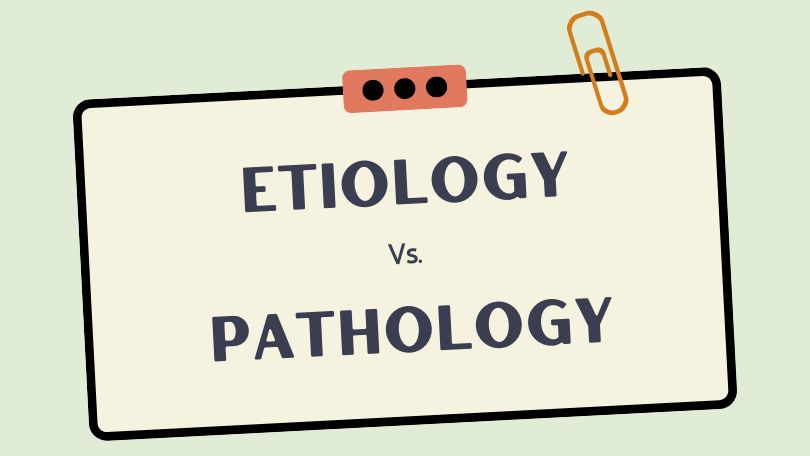Those who have a scientific education may readily distinguish between etiology and pathophysiology. The problem arises if the same message is repeated to a large number of individuals. These two words may best be explained by comparing and contrasting them.
Despite their tight association, there is just one significant distinction between the two names. Pathology and etiology are both scientific concepts that refer to the study of illness. These two phrases first appear in epidemiology, a discipline that specializes in the in-depth examination of illness.
To describe a disease, scientists and physicians utilized terms like etiology and pathology, which are also used by scientists. As a result of their near-synonymous nature, people often use them as synonyms. As a result, knowing how and when to use these terminologies is critical for optimum comprehension.
Pathology Vs. Etiology
Etiology, as opposed to pathology, focuses on the events leading up to the onset of a disease or damage. Pathology, on the other hand, focuses on the processes that take place in the last stages of an injury or illness. Etiology focuses on illness prevention and causes, whereas pathology focuses on disease symptoms and cures.
The study of illness etiology is referred to as the study of the disease’s cause. etiology is another term for this study. Preventive and causative research is the focus of this method. The process of etiology was identified by Robert Koch. There are three sorts of etiology. Extrinsic, intrinsic, and idiopathic. This is a crucial step in the prevention of illness. That which occurs in the early phases of damage or sickness.
Pathology is the study of the symptoms of different illnesses in great detail. The latter method of illness research is used here. Another name for this is pathogenesis. Pathology’s founding father, Rudolph Virchow, is revered. It may be divided into three categories: molecular pathology, clinical pathology, and anatomic pathology. The ultimate phases of an injury or illness are described in pathology. This is a vital step in the treatment of sickness.
Etiology
The term “etiology” refers to the study of what causes an illness or damage. In addition, it relates to the way in which an injury was caused. A thorough investigation of the disease’s genesis and early stages is necessary for this procedure. Several variables have a role in an organism’s susceptibility to illness. In order to fully understand a disease’s etiology, it is necessary to identify all the risk factors.
In addition, it works to prevent the onset of a number of disorders. An etiology is an explanation for why something happened. It’s a term from the Greek language. This concept of etiology has been employed by philosophers and scientists alike in a variety of disciplines including medicine and geography as well as psychology and political science for the purpose of geographical analysis.
Pathology
Pathology is the scientific study of disease, damage, and other health problems in great detail. A wide range of medical procedures and biological research domains are also involved in the pathology. In today’s contemporary times, the phrase has taken on a more streamlined connotation in the context of medical care, referring to tests and procedures.
Modern medicine is covered by general pathology. Different yet related medical disciplines are within the purview of this discipline. Apart from bodily fluids and tissues, this method may also be used to evaluate cells and cells samples. A pathologist is a doctor who specializes in the study of disease. It’s no secret that pathology has become a major part of modern medical study and diagnostics.
Difference Between Etiology and Pathology
- Etiology is the first step in the study of illness, whereas pathology is the second step.
- Etiology refers to the study of the disease’s cause. In contrast to this, pathology is defined as the in-depth examination of illness symptoms.
- The terms “etiology” and “pathogenesis” are interchangeable terms in the scientific community.
- The etiology process was found by Robert Koch. Rudolph Virchow, on the other hand, is regarded as the founder of modern pathology.
- In the field of etiology, there are three main categories. Extrinsic, intrinsic, and idiopathic. Molecular pathology, clinical pathology, and anatomical pathology are all three forms of pathology.
- An injury or disease’s etiology is well described by the term “etiology”. Pathology, on the other hand, focuses on the last stages of a disease or damage.
- Preventing illness via etiology is crucial, but treating disease requires pathology.
Conclusion
Etiology and pathology are two scientific concepts that refer to the study of illness in great detail. Despite their resemblance, there are several significant distinctions between the two names. The scientific method may be harmed if the wrong phrase is used in lieu of the correct one in a research article.
Prior to the study of pathology, the etiology of a disease is examined. Health concerns and risk factors are both studied in etiology. The study of etiology also includes bacteria, other alien species, and genetic predispositions.
Pathology is the branch of medicine that deals with illnesses once the investigation into their causes is complete. Disease development, risk factors, and the conditions that lead to full manifestation are all studied in pathology.

